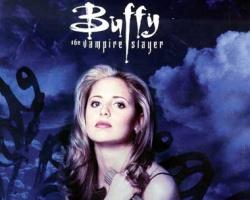The Nineties: Joss Whedon
“Note to self: religion freaky.” This statement from “Buffy the Vampire Slayer” (1997-2003) could in fact sum up the religious approach of series creator Joss Whedon in all of his television programs to date: “Buffy, Angel” (1999- 2004), “Firefly” (2002-2003) and “Dollhouse” (2009-2010). Whedon, a third- generation television writer and professed atheist, continues to cycle back to questions of self-sacrifice, redemption, the nature of evil and the perils of “group think.” His groundbreaking television series have appeared to be of two minds about religion. Without exception, they expressed grave suspicion of religious institutions (and indeed, almost all institutions, including government); but also without exception, they celebrated what “Buffy” coproducer Marti Noxon has called “a yearning for belief.”
On “Buffy,” cosmic possibilities seem limitless on the one hand—there are untold demigods, demons and alternate dimensions (including a land of perpetual Wednesday)—but the show is decidedly close-mouthed about a capital-G God. In the fourth season, for example, vampires take over a church, a building they always have feared as powerful, even lethal. But the place turns out to be “nothing,” one sniffs. “Where’s the thing I was so afraid of…you know, the Lord?” God in the traditional sense is absent from the church; there isn’t even a priest or minister to be found. There is, however, a vampire slayer who strides in as a savior to the hostages in the pews. In the Whedonverse, “God” is to be found in human acts of moral courage, as people risk everything for others.
This humanism extends to the show’s treatments of religious leaders. Whereas other television series often have depicted clergy in a positive light (e.g., “7th Heaven”), the Whedonverse typically regards religious leaders with suspicion. “Buffy”‘s third season opened with an episode about a street preacher who literally sucked the life out of the teenagers in his ministry, and the final season’s supervillain was a defrocked killer priest (deliciously portrayed by Nathan Fillion), powered by regular infusions from a pure, pri- mordial First Evil.
“Angel,” “Buffy”‘s darker spin-off series, took an even more skeptical turn in its fourth season, when a goddess named Jasmine (Gina Torres) engineered various machinations to obtain a human birth and take over the world. Under her spell, Earth’s inhabitants committed all manner of evil in the name of establishing world peace. The episode “Shiny Happy People” exposed the dangers of religion as a form of mind control, as Jasmine subtly hypnotized everyone around her and caused them to believe the evil they were perpetrating was actually for the greater good. In that story arc, people believed the world had become a happier, better place, but the cost was the loss of all free will—to a deity who was more likely to eat humans than protect them.
In all of Whedon’s television series, the theme of redemption is paramount. On the futuristic “Firefly,” a smuggler’s spaceship is populated by a motley crew of individuals trying to flee old lives and build new ones, from former soldier Captain Mal (Nathan Fillion again) to wunderkind River Tam (Summer Glau), whose formidable intellect already has unleashed dangerous powers in the imperial Alliance and within River herself. Notably, one of the characters on “Firefly” is Shepherd Book (Ron Glass), the closest Whedon ever gets to a positive portrayal of clergy. But Shepherd is fleeing a past himself, finding in a simple monastic spirituality the moral courage he perhaps did not demonstrate when he was in the upper echelons of the Alliance. All these characters are seeking redemption, which in Whedon’s world is sometimes forthcoming but just as often slightly out of reach.
Whedon has said that all of his series wind up focusing on what it means to create a family. In “Buffy,” “Angel,” “Firefly” and Dollhouse, disparate people (as well as vampires, witches, aliens and demons) often discover the most powerful family is the one you choose for yourself. Family for Whedon is the incomparable connection that can exist only among those on the margins, fighting impossibly powerful establishments. They have only each other for understanding and much-needed gallows humor. In all four shows, the series finales depict what becomes possible when such an unstoppable family chooses to fight against evil and for one another, often at the cost of their lives.
If this can be called religion (and why can’t it?), then all four series are infused with deep spiritual power.




